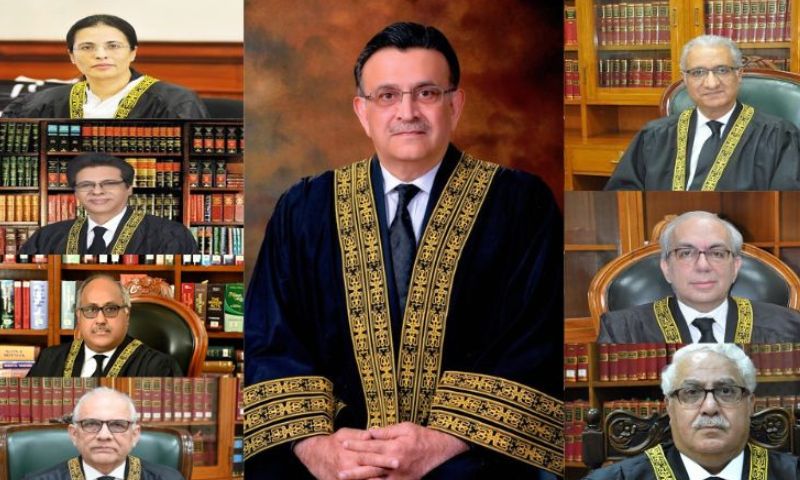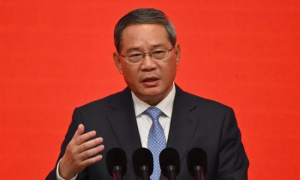ISLAMABAD: An eight-member larger bench of the Supreme Court (SC) of Pakistan headed by Chief Justice Umar Ata Bandial will take up the constitutional petitions against the “Supreme Court (Practice and Procedure) Bill, 2023 today (Thursday) at 11:30am.
Justice Aminuddin Khan and Justices Qazi Faez Isa had earlier ruled that the Chief Justice did not have the power to constitute special benches or decide its members and ordered postponing all suo-moto matters. The three-member bench order was later recalled by a six-member larger supreme court bench. Justice Isa, in a judicial note, later held that the six-member larger bench did not “constitute a constitutional court”.
SC bench
The bench comprises of CJP Umar Ata Bandial, Justice Syed Hassan Azhar Rizvi, Justice Ijaz ul Ahsan, Justice Munib Akhtar, Justice Shahid Waheed, Justice Muhammad Ali Mazhar, Justice Sayyed Mazahar Ali Akbar Naqvi and Justice Aisha A. Malik.
According to the cause list issued Wednesday, three petitions were filed under Article 184(3) of the Constitution by Advocate Muhammad Shafay Munir, Chaudhry Ghulam Hussain, Raja Amer Khan and others. Article 184(3) of the Constitution sets out the Supreme Court’s original jurisdiction and enables it to assume jurisdiction in matters pertaining to a question involving “public importance” with reference to the “enforcement of any of the fundamental rights” of Pakistani citizens.
The petition filed by Advocate Munir pleaded that the petition had been filed to safeguard and secure the Constitution and independence of judiciary. He said that the petitioner believed in the supremacy of the Constitution, independence of the judiciary, rule of the law and had always strived and struggled to protect the Constitution, fundamental rights guaranteed under the Constitution and independence of the judiciary. The respondents in the petition include the federal government through the secretaries of Law, National Assembly and Senate.
Passage of the bill
The national assembly had approved the bill on March 29. On March 30, the senate passed it and then was referred to the president for his approval. The president, however, returned it with objections that it was a “colourable legislation”. He underlined that Article 191 of the Constitution empowered the apex court “to make rules regulating the practice and procedure of the Court”.
On Monday, the bill was passed by the parliament’s joint session. As per the Constitution, the bill was again sent to the president for his assent for approval and pending with him. If he does not sign it within 10 days, assent will be deemed to have been granted.
According to the legislation, a three SC judges; the CJP and the two senior-most judges will decide whether or not to take up a suo-moto. Previously, it was solely the prerogative of the Chief Justice.
The law also states that every cause, matter, or appeal before the apex court would be heard and disposed of by a bench, constituted by a committee made up of the chief justice and the two senior-most judges. The legislation also gives the right to file an appeal within 30 days of the judgment in a suo-moto case and that any case involving constitutional interpretation will not have a bench of fewer than five judges.
The bill also allows former prime minister Nawaz Sharif and other parliamentarians including Jahangir Tareen disqualified by the Supreme Court under suo-moto powers to appeal their disqualification within 30 days of the fresh law’s enactment.
According to the petition, the Supreme Court while exercising powers under Article 191 of the Constitution, has already framed the rules regulating its procedure and practice, and “Order X1 of Supreme Court Rules 1980 provides Constitution of Benches, and this power lies with the Chief Justice and these powers could not be curtailed through an act of the Parliament being beyond its jurisdiction and areas of enactment.
“The Supreme Court is established, empowered and regulated by the Constitutional Provisions given in articles 176 to 191, but not by any other law made by the Parliament and it is fully secured in the preamble. Hence, if any curtailment of powers of the SC or its Chief Justice is required to be made, it could only be made through the Constitutional Amendments with two Third Majority but not by single majority by way of passing [the] bill in an ordinary manner”.
The petition prayed to the court to accept the petition and declare the “impugned” bill as “ultra vires and unconstitutional and of no legal effect”.























